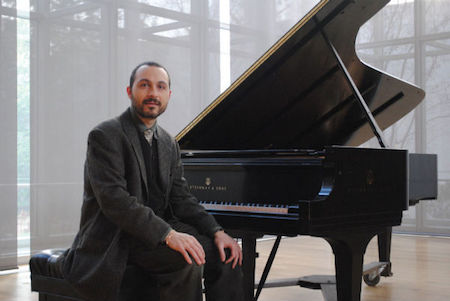by Daniel Hathaway

Pompa-Baldi began with a strong, clear performance of Johann Nepomuk Hummel’s Sonata No. 2, Op. 13. A contemporary of Beethoven and a student both of Haydn and Mozart, Hummel has largely been ignored in our times except for a trumpet concerto. This E-flat Major work is sturdy, attractive, and requires enough virtuosity to give an audience an immediate sense of the prowess of the performer. Pompa-Baldi highlighted its dramatic qualities while establishing his technical creds from the outset.
Franz Liszt embarked on an ambitious project to compose etudes in all 24 major and minor keys but — long story short — only completed a dozen of them in the natural and flat keys. The Russian pianist-composer Sergei Lyapunov completed the set with his own dozen in the sharp keys, dedicating the last to the memory of Liszt.
Pompa-Baldi followed the Hummel Sonata with Lyapunov’s Transcendental Etude No. 12, a dark, rumbly, moody piece dizzy with notes that Liszt might have written himself, except that Lyapunov’s enjoys more of a sense of clarity. Again, Pompa-Baldi played with strength and power, yet always with control.
Among the pianist’s 20 CDs is The Rascal and the Sparrow, a collection of piano elaborations by Roberto Piana of Edith Piaf songs, along with Pompa-Baldi’s own arrangements of songs by Francis Poulenc. Poulenc and Piaf may never have met, but his music shares many similarities with the songs of the great chanteuse.
Pompa-Baldi made an entremet out of five tracks from the CD, providing a delightful change of pace at this point in his program. Poulenc’s Improvisation N. 15 “Homage á Edith Piaf and Les Chemins de l’Amour fit nicely among Piana’s versions of La Vie en Rose, Je sais comment, and Hymne a l’Amour, and the pianist played them with easy grace.
The program ended with Nikolai Medtner’s Sonata Tragica, Op. 39, No. 5, written the year before the composer self-exiled from Russia and entered a period in his life that could aptly be labeled tragic. The piece makes a strong impression — a striking series of chords appears twice — and Pompa-Baldi put it across boldly, even allowing himself a bit of pianistic excess toward the end.
As a gentle, expressive encore, Antonio Pompa-Baldi sent the audience out with a Kabalevsky Nocturne.
Published on ClevelandClassical.com February 21, 2018.
Click here for a printable copy of this article


